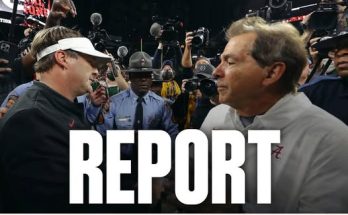Texas Longhorns head coach Steve Sarkisian announced on Thursday that quarterback Arch Manning will be in the starting lineup this Saturday against Vanderbilt, a decision that instantly electrified Austin and sent ripples across college football. The much-anticipated return of one of the sport’s most celebrated young quarterbacks comes after a tense week of uncertainty, following Manning’s brief stint in concussion protocol after Texas’ gritty overtime victory over Mississippi State. For Sarkisian and the Longhorns, this move signals more than just a return to form — it’s a statement of resilience, leadership, and belief in the future face of Texas football.
Arch Manning’s journey to this moment has been anything but ordinary. Carrying one of the most storied last names in football, expectations have always been sky-high for the former five-star recruit out of Isidore Newman High School in New Orleans. Since arriving in Austin, Manning has had to navigate the pressure of legacy, the intensity of competition, and the reality of patience in a quarterback room that once featured standout Quinn Ewers. Yet as the 2025 season has unfolded, Manning has shown why his name has remained synonymous with promise — blending poise, intelligence, and arm talent with a growing command of Sarkisian’s complex offensive system.
Saturday’s matchup against Vanderbilt offers Manning a pivotal opportunity — both to solidify his place as the unquestioned starter and to remind the nation that Texas remains a legitimate playoff contender. Sarkisian’s decision to reinstate him after the concussion scare reflects both trust and necessity. Manning’s absence during practice earlier in the week sparked speculation that the Longhorns might lean on backup Maalik Murphy for at least one more start, but Sarkisian dismissed those doubts with confidence, saying, “Arch is fully cleared, he’s ready, and he’s looked sharp in preparation. We wouldn’t put him out there if he wasn’t 100 percent.”
For Manning, being 100 percent isn’t just about health. It’s about rhythm, timing, and leadership — traits that define elite quarterbacks at the collegiate level. The win over Mississippi State, though costly in terms of physical toll, was a microcosm of Manning’s growth. He faced relentless pressure, absorbed big hits, and still delivered in clutch moments, orchestrating two fourth-quarter scoring drives that kept Texas alive before sealing the victory in overtime. It was a game that tested both his mental toughness and his physical resilience, and by all accounts, he passed with flying colors before being sidelined for precautionary evaluation.
The timing of his return couldn’t be better. Texas, sitting comfortably within striking distance of another Big 12 title game berth and with playoff ambitions still alive, needs a spark after back-to-back games that tested their consistency. Sarkisian’s offense — known for its balance between precision passing concepts and a physical ground attack — thrives when the quarterback operates with confidence and tempo. Manning’s ability to process defenses quickly, adjust protections, and make throws on the move adds a dynamic edge to a system that demands versatility.
While the opponent, Vanderbilt, might not strike fear into the hearts of most SEC-caliber programs, Sarkisian and his staff have been vocal about maintaining focus. Vanderbilt’s defense has shown flashes of discipline and creativity, particularly with disguised coverages that could challenge a quarterback coming off an injury. Sarkisian emphasized during his Thursday press conference that the Longhorns’ approach won’t change simply because of the opponent. “We respect every team we play,” he said. “Our standard doesn’t change. Arch knows that. The expectation is to execute our game plan at a high level, limit mistakes, and continue to improve.”
For Manning, this game represents more than just another start. It’s another chapter in his evolution as the face of Texas football. Since taking over the starting job earlier this season, he has brought an infectious sense of calm and control to the huddle. His chemistry with receivers like Xavier Worthy and Johntay Cook has blossomed, particularly on deep timing routes and play-action concepts. More importantly, his leadership has earned the respect of veterans on both sides of the ball. Teammates describe him as “steady,” “humble,” and “laser-focused,” qualities that have translated into consistent preparation and execution.
What separates Manning from many of his peers, however, isn’t just talent — it’s his deep understanding of the game. Growing up around NFL royalty — from uncles Peyton and Eli to grandfather Archie — gave him a rare education in reading defenses, anticipating pressure, and understanding situational football. That football IQ is exactly what Sarkisian has leaned on in high-pressure moments. In overtime against Mississippi State, for instance, Sarkisian gave Manning freedom at the line to adjust into a quick-hitting slant that set up the game-winning touchdown. That kind of autonomy speaks volumes about the trust between coach and quarterback.
Yet even as Manning takes the field again, there remains a layer of caution surrounding his return. Concussions are no small matter, and Texas’ medical staff has been meticulous in evaluating his progress. Sarkisian made it clear that the team followed every protocol to the letter. “We’re not going to jeopardize anyone’s health — not Arch’s, not anyone’s,” he said. “He’s been symptom-free, he’s cleared every step, and he’s had multiple full-speed practices this week. He’s ready to roll.”


